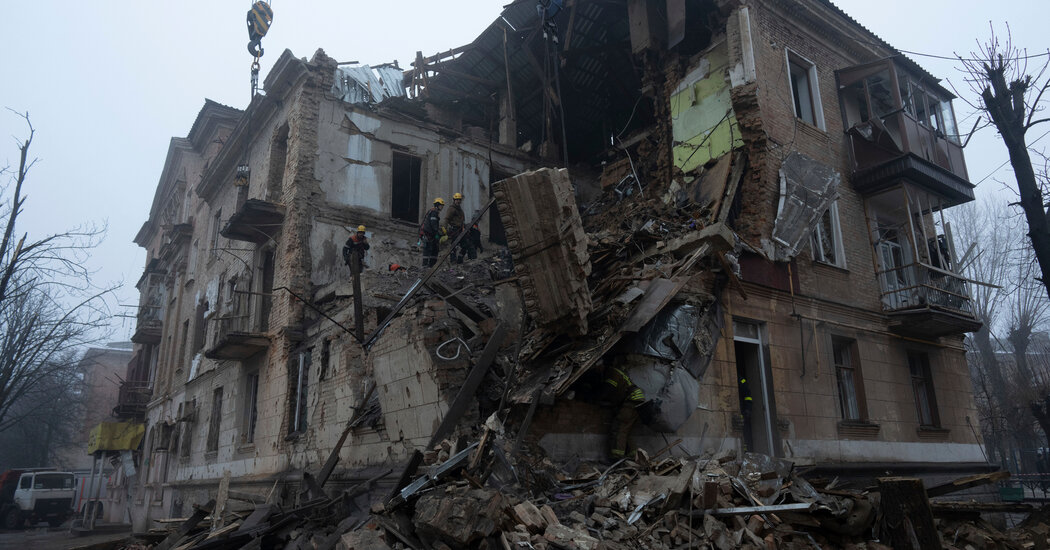KYIV, Ukraine — In subfreezing weather, Russia launched dozens of missiles and drones at Ukrainian energy systems on Friday, pitching millions of civilians into the cold and dark in its deadly campaign to batter — and freeze — the populace into submission.
In the central city of Kremenchuk, Mayor Vitalii Maletsky said that heat was out for more than 200,000 customers as temperatures hovered around 14 degrees Fahrenheit, and implored people to “close all windows and take all possible measures to preserve heat.” In Kyiv, the capital and largest city, even after hours of emergency repairs, two-thirds of the residents had no heat and water, and 60 percent had no electricity, Mayor Vitaliy Klitschko said in the evening.
In the ninth large-scale wave of attacks on Ukraine’s civilian infrastructure this fall, and the second this week, explosions shook cities and towns across a country where millions of people have already been bombed or frozen out of their homes.
Frustrated and angry, Ukrainians living far from the front lines but under increasingly harsh conditions voiced a desire for relief — and vengeance.
“See how we live,” said Gennady Omelyan, a taxi driver in Kyiv. “We are fed up! We need to hit back at Russia. Give us weapons. We have enough soldiers — give us weapons.”
The barrage came as Ukrainian military and political leaders warned in a series of interviews and news conferences that Russia was preparing for a new ground offensive this winter, and would likely make another attempt to seize Kyiv. They did not cite specific intelligence, but their statements amounted to a coordinated pushback against talk from Moscow — and some officials in the countries backing Ukraine — about possible peace negotiations.
President Volodymyr Zelensky and his top advisers insist that Russia, which invaded unprovoked in February, is not serious about peace, and that any pause in the war would only give the Kremlin time to cement its grip on the territory it has seized, and to rebuild its forces for a renewed assault on Ukraine. Officials in Kyiv fear that their Western backers, wearying of high energy prices and the cost of supplying Ukraine, might be all too eager to accept a cease-fire.
Ukraine’s defense minister, Oleksii Reznikov, told the Guardian newspaper that a new Russian offensive could come as soon as February. General Valeriy Zaluzhnyi, the country’s top military commander, said in an interview with the Economist that it “may take place in February, at best in March, and at worst at the end of January,” and could come from the east, north or south.
“The Russians are preparing some 200,000 fresh troops,” General Zaluzhnyi said. “I have no doubt they will have another go at Kyiv.” He did not cite evidence for either assertion.
Russia’s military has been badly mauled in the war, suffering, by Western estimates, more than 100,000 casualties and seriously depleting its supply of missiles and armored vehicles. President Vladimir V. Putin in September ordered the call-up of 300,000 conscripts, some of whom have been deployed to Ukraine, often with inadequate training or equipment.
Western officials and military analysts said that Ukraine’s assessment of Kremlin intentions was probably correct, and that Mr. Putin still aims to subjugate Ukraine, even if his capabilities may not match his ambitions. And U.S. officials have made clear that they do not expect the war to end any time soon.
But experts said they did not see evidence so far of Russian forces preparing for a major new push, and questioned whether they would be able to mount one over the winter, though it is difficult to know what is happening on Russian bases.
“We’re not seeing any indication of an imminent move on Kyiv,” John F. Kirby, a spokesman for the National Security Council, told reporters in Washington, although he emphasized that Mr. Putin had not abandoned his “maximalist” aspirations to control Ukraine, and could at some point seek to expand the war again.
Konrad Muzyka, an independent defense analyst and the director of Rochan Consulting, said it seemed unlikely that Russia would be able to mount a large-scale counterattack in the next two to three months given its heavy losses, current failures to prepare soldiers for winter combat, and continuing logistical and organizational struggles.
With their troops losing a large chunk of the territory they had conquered in eastern and southern Ukraine, Russian forces this fall dramatically increased their aerial attacks on civilian infrastructure across the country, in an apparent bid to terrorize and immiserate the population and sap its will to fight.
“They still have enough missiles for several such heavy strikes,” Mr. Zelensky said in his nightly video address. “We have enough determination and self-belief to return our own after these blows.”
In the interview with the Economist, General Zaluzhnyi struck a more ominous tone.
“We are balancing on a fine line,” he said. If the Russians destroy the grid, “that is when soldiers’ wives and children start freezing.” At that point, he said, “What kind of mood the fighters will be in, can you imagine? Without water, light and heat, can we talk about preparing reserves to keep fighting?”
The Russians have fired ballistic missiles, cruise missiles and Iranian-made exploding drones, and there are fears that they will also turn to Tehran to replenish their stocks of ballistic missiles. The Biden administration is expected to supply Ukraine with a Patriot missile battery, the most advanced American air defense system, which, unlike others used by Ukraine, can shoot down ballistic missiles flying at several times the speed of sound.
Ukrainian air defenses have become adept at deflecting the attacks, so Russia has taken to firing missiles and drones in large swarms, as many as 100 at a time from multiple directions, to overwhelm those defenses and allow some to penetrate. But recent experience shows that even a few reaching their targets can do significant and lethal damage, and sometimes falling debris from missiles that are shot down does, as well.
General Zaluzhnyi said in a statement that Russia had launched 76 projectiles at infrastructure targets on Friday across Ukraine, whose air defenses managed to shoot down 60 of them. That ratio is actually below recent standards. Large explosions were reported in cities across the country, including the three largest, Kyiv, Kharkiv and Odesa.
Mr. Zelensky’s deputy chief of staff, Kyrylo Tymoshenko, said that emergency power outages were being introduced “across the country” to ration energy as crews scramble to repair the damage. “We ask for your understanding regarding the power outages and temporary water and heat supply interruptions,” he said in a statement.
Ukrenergo, the national electric utility, said that after the strikes it was able to meet less than half the country’s energy demand. In the central Kirovohrad region, roughly a million people were left “completely without electricity,” said Andriy Raikovych, the head of the regional military administration.
Ukraine’s energy minister, Herman Galushchenko, said that as many as nine power-generating facilities had been damaged, along with transmitting substations, the Ukrinform news agency reported. Parts of the national rail system were forced to shut down temporarily.
Mr. Zelensky said a missile had demolished a residential building in his hometown, Kryvyi Rih, in the south, killing three people and wounding more than 10.
In Kyiv, people huddled in stairwells and under overpasses as air raid sirens wailed. Mr. Klitschko, the mayor, said at least three districts of the capital were hit and that subway service was temporarily halted.
“I heard a whistle in the sky for two or three seconds, then an explosion,” said Ruslan Polishchuk, a construction worker in Kyiv. “I felt the blast wave on my cheeks, and it knocked off my hat.”
He said he first joined the crowd of people running to take shelter in a subway station, but it was so packed with people that he decided he was safer above ground.
Reporting was contributed by Richard Pérez-Peña in New York, Peter Baker in Washington and Victoria Kim in Seoul.


